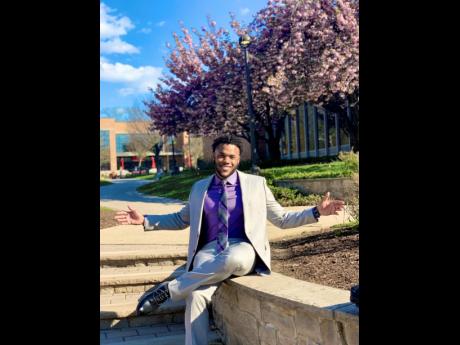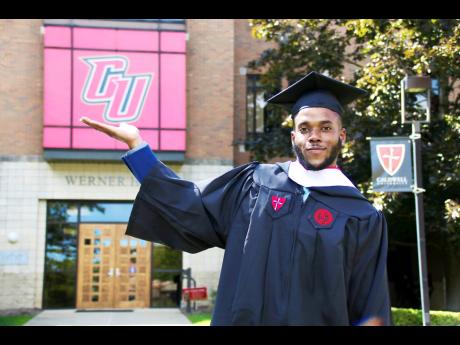Making science work - J’can student experiments with research and business
Two years ago, Jamaica-born Lamar-Shea Chang pitched a proposal for an undergraduate science research project at Caldwell University in New Jersey that not only earned him campus honours but opened doors to the opportunities available in STEM research and business.
He now believes that with the right support and mentorship, many more young persons can make an impact in finding solutions to real-life problems.
He was honoured at the Independent College Fund of New Jersey Undergraduate Research Symposium for research titled ‘Convert every human into a natural mosquito deterrent’.
He said: “Our bodies give off scents all the time; some are undetectable. I then thought, can our bodies give off an odour which wards off mosquitoes while staying undetected by the human sense of smell?”
The project, he says, is remarkable as he didn’t consider himself a scientist or business person, but the project’s potential for success gave his confidence a boost.
“There were students in the Caldwell University science research group who were designing artificial arteries, doing research with breast cancer cells, and working on biofuel production; the possibilities seemed limitless.
“The research experience opened my eyes to the possibilities in science. I was very impressed by the shrewd philosophies that guide the business approaches. It was as if there were no limits to what one could become, and I much preferred this amalgamate learning approach.”
Rastafarian Help
It was a pitch that also drew honours for Jamaica’s often underutilised local medicinal herbs and the local Rastafarian community as a reservoir of knowledge on Jamaican culture.
“I contacted the Rastafarian community to recommend herbs which they thought could be mosquito repellents. The community didn’t know all the chemical components or their interaction with the human body, but they do know if something works. They gave me a list of about nine local plants. I worked it down to about three or four, and I set about extracting the oils and creating conditions in the lab to grow mosquitoes to test the hypothesis.”
The list was narrowed down to neem, rice bitters, and aloe vera.
“The mosquito eggs were sourced all the way from Florida. Some eggs didn’t survive in transit because of the frigid cold temperatures of winter. The hardest part of the experiment was recreating a tropical environment within a lab setting during the winter season. Thanks to the resources and guidance from professors, the impossible tropical environment became a reality.”
He said the daily schedule was a reminder of his days living in Greater Portmore, St Catherine, and attending St George’s College in downtown Kingston.
“On my 5 a.m. routines, I had to be on the first bus out of Portmore to get to school on time. I avoided the later buses because those were always packed,” he said.
Hectic Schedule
He followed the same schedule in New York.
“[Here,] I woke up at 4:30 a.m. and was on the bus to Wall Street, New York City, by 5:30 a.m.,” he said. “I would be back to campus in New Jersey for 4-9 p.m. classes, and between 9 and 10:30 p.m., I was back in the chemistry lab. Every Friday, I was testing the mosquito deterrent hypothesis. I was versed in the conditions the mosquitoes liked: the water, temperature, humidity, resting cycles, and even preferred food source. I knew those mosquitoes like the back of my hand. I knew them because I began spending every free moment with them. Due to my unconventional schedule, my professors would simply give me keys to the lab. Anything else, and the experiment would have failed.
“It was such a bright moment when I found out that the idea actually works,” Chang said. “That was possibly the highlight of my time at Caldwell University.”
Chang migrated to the United States in 2015. The plan was to pursue studies for a career in medicine. His pre-med year, however, saw him experimenting with business studies. “I took a course in economics, and that was it,” he said.
In September, he was selected to give the Caldwell University student commencement address in Caldwell, New Jersey, at the institution’s two undergraduate ceremonies, which had been delayed by four months due to the COVID-19 pandemic.
He received a Bachelor of Science degree in computer information systems and biology with a minor in chemistry. Chang, now a student in Caldwell University’s MBA programme with a focus on global business, currently has a line of herbal supplements, See the Glow, which he says is just one of the many projects to come.
“This is just the start. What I really want to do is instil healthy lifestyle practices in all cultures. I hope to create cultural norms that impact not just a small group of people but the global community.”
He credits his parents for his love of the sciences and ‘technicals’, his business acumen, and charisma, and his aunt for her shrewdness and incomparable work ethic. He says he is still on course for his original career and plans to attend osteopathic medical school and specialise in endocrinology.


